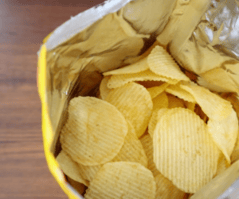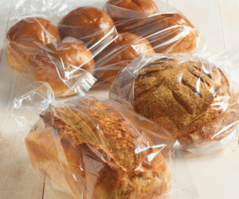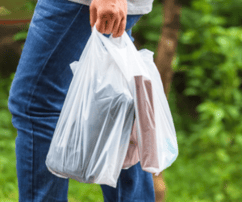Understanding and Identifying Soft Plastics

Soft Plastics have grown in popularity and are now an everyday part of life for consumers and businesses. Due to their widespread use, it is crucial that there is understanding around what they are, where they are used and how to dispose of these materials correctly to ensure that these materials are used in a sustainable way and their impact on the environment is kept to a minimum.
What are Soft Plastics?
Soft Plastics is a broad term used for a common packaging material, and can consist entirely of one type of plastic, or multiple types, layered alongside other materials like aluminium and cardboard. Soft plastics usually consist of one of three types of plastics – Low-density Polyethene (LDPE), High-density Polyethene (HDPE) or Polypropylene (PP). This film is ‘soft’ in structure, and an easy way to identify a soft plastic product is a product that scrunches up and doesn’t bounce back.
Common items that include soft plastic films are bread bags, grocery bags, bubble wrap and various plastic wrappers of food items. Thermogard and other cool-chain packaging companies utilise soft plastics in their ice packs, carton insulation options.



Understanding Soft Plastic Films
The argument for the use of these plastics is evident, due to their continued use across multiple industries, however if not identified and recycled properly, they can do more harm than good. Soft plastics have been looked down on by many and the name has had a lot of ‘bad press’, however, as local governments continue to invest in recycling technology, certain plastics are now able to be upcycled into other useful products.
Soft plastics are incredibly popular as a packaging material and have been for a long time, and for good reason. Positive aspects of soft plastic use include the fact that they can are reutilised when recycled correctly and made into plastic pallets, furniture, and other assorted items, and are therefore not adding to landfill. Additionally, as we recycle this waste material instead of disposing, like for materials like glass, so therefore soft plastics require less energy to be recycled. As a packaging material, it is lightweight, yet durable and extremely cost effective to manufacture and transport.
However, as with any plastics, there is a downside, apparent when irresponsibly used or disposed of. Soft plastics can be unsustainable and harmful to the environment if they are not recycled correctly, and it is reported than over 90% of existing plastic in the world has never been recycled. When manufactured, carbon dioxide is produced in large amounts and adds to already high greenhouse gas levels. They can cause costly damages to normal plastic recycling factories, can add to landfill, and due to their lightweight components, can be blown out of landfills and pollute the environment. When breaking down in the environment, they can further inflict damage on the environment as these small pieces enter waterways, our soil and can be ingested by animals.
Can I recycle Soft Plastics?
Soft plastics can be recycled, although in some countries this may be considered specialist recycling. Soft plastics cannot be recycled in your kerbside bins and will need to go to a soft plastics recycling depot, or more commonly, taken to participating supermarkets who house dedicated soft plastic recycling bins.
It is crucial to separate soft plastics from your normal recycling or rubbish as when these films are recycled through the proper methods, they are are reused and blended with other components to create new products, saving raw materials and energy, instead of adding to landfill.
To recycle soft plastics, you must ensure the plastic film is clean and free from any food remnants, as this is standard procedure with any plastic packaging. Once clean and dry, soft plastics can be gathered and dropped off at a soft plastics recycling bin, commonly found in supermarkets across New Zealand*. Find your nearest drop-off here**;
*Unfortunately, Soft Plastics recycling is no longer available in Australia.
**Please note that our US Gel Ice Packs Soft Plastics Film is a number 7 plastic, and should be recycled at an appropriate depot near you.
To conclude, soft plastics are a large and useful part of life for both businesses and consumers, and do not appear to be disappearing any time soon. Therefore, it is important to be able to identify the soft plastics you are using, and ensure they are being recycled correctly, so collectively we can minimise their potential environmental and dispose of these materials responsibly while they still exist.
Thermogard continues to innovate and deliver quality cold-chain packaging solutions, if you are interested in finding out more about different solutions available or you have questions about soft plastics, get in touch now.
